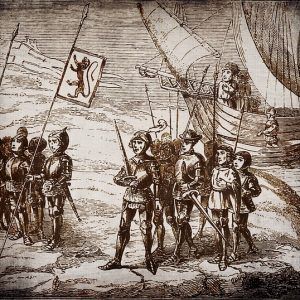Before Africa was partitioned and colonized, so my history teacher taught me, the continent went through a period of mass decline. It was a history class topic called “The Decline, Conquest, and Partition of Africa.”
However, the subtopics about conquest and partition usually receive a lot of scholastic attention while the decline remains cloaked in mystery.
In this article, I will argue that the mystery of Africa’s decline prior to partition and colonization can be solved by diving into the slave trade period.
The period of African slavery lasted more than 400 years between the 15th and 19th century and was responsible for the total disruption of the African Way of Life.
The extent of slavery in Africa
During the slave trade period, Africa was hounded for slaves from all directions.
In West Africa, the trans-Atlantic slave trade started in 1441 and continued to 1848 and involved the kidnapping and sale of an estimated 11-20 million West Africans to the Americas.
In Eastern Africa, the Indian Ocean slave trade based around the Swahili ports of Mombasa, Zanzibar, etc. sold an estimated 4 million people to slavery in Asia and plantation islands in the Indian Ocean.
In The North, the trans-Saharan slave trade was responsible for the enslavement of an estimated 9 million Africans. These unfortunate souls would end up in Europeanized Northern Africa and Southern Europe among other destinations.
Finally, the Red Sea slave route carried as many as 4 million people to slavery in the Arabian Peninsula.
In total, an estimated 30 million Africans were sold to slavery abroad between the 1500s and the 1800s. Apart from the triangular trans-Atlantic commerce, little is known about the methods, destinations, and players involved in the capture and selling of Africans into slavery.
A practice intertwined with violence
The institution of slavery has existed in Africa pretty much since antiquity. A system of slave exchange would have started innocuously enough long before Portugal carted the first slaves across the ocean in 1441.
This system had remained in place for thousands of years. For example, the pyramids of Egypt, a world marvel to this day, were built partially with imported smith labour.
However, during the slave trade of the 15th to 19th centuries, enslavement became a cause rather than a side-effect of wars. Demand in Europe, Arabia, Asia, and the Americas created a lucrative market for captives and armed rebels started raiding to get slaves, using superior weapons provided by their European accomplices.
The African slave wars
To stay in power, African kings were forced to trade their own captives for guns to defend themselves. Before long, the whole of Africa was engaged in internal wars.
It is estimated that at the height of the trans-Atlantic slave trade in the 18th century, as much as 90% of Africa was at war with each other.
Worse still, the African slave wars became about survival for the fittest. You see, slaves were exchanged for guns- the most strategic defensive weapon of the age.
Communities that failed to participate in the exchange would ultimately find themselves defenseless when the slavers (often their own neighbours) came. The worst impact of African enslavement was not so much that nearly 30 million of us were forcefully taken out of the continent. Both for the victims and the survivors, slavery eroded the African Way of life which had been based on mutual co-existence and cooperation for thousands of years. Trust between tribal communities disappeared, and the current fragmentation of Africa started.
To put it in context, slave wars were the cause of the most serious refugee crisis in Africa. In just 400 years, the population map of Africa changed for good.
Having lost their lands to the centuries-long plunder of the slave trade, many communities sought new homes in distant lands. The Maasai are just one of many communities that were settling in new lands in the 1800s.
Choosing to forget
There has been a lot of debate lately about who should be held responsible for the slave trade. Crucially, the idea of Africans as innocent bystanders has been challenged.
Only when you dive deeper into the history of the slave trade does it become clear how destructive slavery was to Africa. Every single community was adversely affected.
The slave-selling communities were afflicted by guilt for selling too many of their neighbours to slavery. Communities that had lost members to slave raiders were desolate and weakened.
And even though 17% of slave ships were wrecked by slave rebellions before crossing, there was no organized response to the scourge of slavery in the land.
The slave period was the greatest plunder of African lands in which non-other than the very owners of said lands were complacent in one way or another.
The way forward
Whether we acknowledge it or not, the slave trade period was a period of mass disruption in Africa. It is estimated that the population of Africa was less than what it would have been in 1800 had the slave trade never happened.
Slavery shaped not just the economic fortunes of Africa, but also her culture and community.
We must acknowledge this dishonourable period in our history and the impact it had on our collective psyche. Failure to do this, Africa is fated to remain trapped by the unhealed wounds of a truly grisly and traumatic event that affects us all on the subconscious level.
Also read: Africa’s History: A Case of Too Many Gaps and Unanswered Questions





